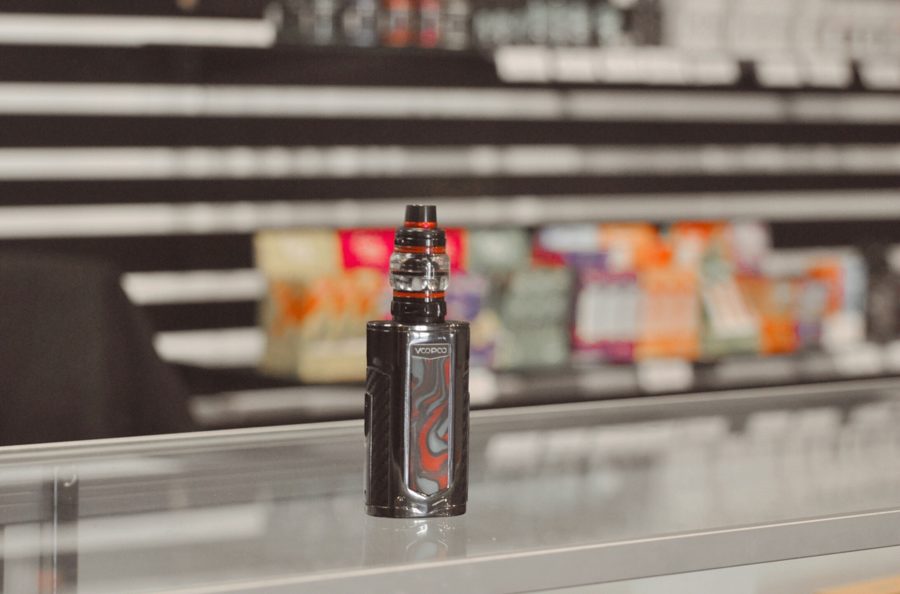Iraq veteran Bill Wikstrom smoked cigarettes for over 20 years before he switched to vaping. A vape store owner and former two-pack-a-day smoker, Wikstrom said he believes he would not be alive for his grandkids had he not found a way to quit cigarettes.
Recent news related to vaping and e-cigarette illnesses and deaths have increased customer concerns and upset Wikstrom, making him one of many business owners concerned about the effects of news related to vaping illness and death.
“If you destroy this industry and the shops that are actually the ones holding the line and preventing people from doing this kind of stuff, then just imagine all the illnesses that you’re going to have from people who don’t know s— about it,” Wikstrom said.
Wikstrom is the owner of Vaporized and 12 other vaping and e-cigarette shops in the Southeast. Besides owning stores, Wikstrom owns and sells a brand of vape juice called Paradigm.
According to Wikstrom, the difference between his juice and the ones that have been linked to deaths is that Wikstrom said he tests his juice through the Food and Drug Administration, and all four of his juices’ ingredients are items found at a grocery store: propylene glycol, vegetable glycerin, nicotine and artificial flavoring.
As of Oct. 29, the Centers for Disease Control and Prevention said that 1,888 cases of lung illnesses and 37 deaths, one of which was in Mississippi, have been linked to vaping and e-cigarette products. Most patients report a history of using products containing THC, and the CDC currently recommends people not to use vaping products containing THC.
Wikstrom said that media sensationalism has led to a misconception between the type of vape juice he sells and the THC-based juice that is cut with chemicals like formaldehyde.
“It’s all about the misleading headlines. Because what may happen is you might actually have a shred of journalistic integrity,” Wikstrom said. “And then you go back and look over it with your editor, and they may say, ‘You need to change this to something that’s a little bit more sensational.’”
Melisa and Craig Brown are a married couple and owners of Twisted Vapes shop and Golden Cutz salon on Fourth Street. Together they have seen the effects of the news surrounding vaping and e-cigarette illnesses. Prior to the recent news, the couple was able to make a living off of their business. Now they risk closure and Craig Brown is going back to his construction job, so that they can pay the bills.
“We can definitely tell a cut in new customers for sure because I think all this negative publicity is making people scared to come in and get educated on what we actually sell,” Melisa Brown said. “And we’re a small shop. You can tell by our numbers that we aren’t selling anything illegal. We were never trying to get rich off of it anyway. We wanted to make a living.”
Mississippi State Department of Health has reported seven cases of vaping-related lung illness since Oct. 22 with all cases being of 18-34 year-olds. Three reported illnesses were from exclusive use of nicotine, three were from exclusively THC and one was from a combination of both.
The department warns of the harm in vaping and e-cigarette products containing THC and said no specific brand or product has been linked to the outbreak. The department recommends for concerned vape users to refrain from vaping and for ex-cigarette smokers to not switch back.
Some vape shop owners and advocates agree with the Department of Health about the dangers associated with non-FDA approved products as well as not following the given rules of one’s vaping device. Juul, an e-cigarette device that has seen controversy and lawsuits over its youth-centric advertising, sells individual vaping pods that contain nicotine and can be popped out of a chewing gum-like package.
Twisted Vapes worker Patty Thornton said these single-use vaping pods, made for products like Juul and its rival Blu, can cause injuries when unknowing users attempt to refill them.
“None of our shops support Juul,” Thornton said. “You see college kids using them obviously, some of your friends probably use them. There’s kids trying to take the cheap way out and refill them. Do you know how unsafe it is to refill Juul pods? That is not what they are for.”
There are currently nine stand-alone, operating vape shops in Hattiesburg. Convenience stores have become the highest earners in the industry, though.
Walmart, Walgreens and Kroger recently announced they would no longer sell e-cig products because of the outbreak. E-cig products like Juul and Blu are still commonly found in convenience stores.
Owners of vape shops and advocates for the right to vape are angry, but also scared. In a once-growing industry that now finds itself as the face of an outbreak, there remains a community of people who wish to make a living and not turn back to cigarettes.
“I cut 38 paychecks. For some of these people, it’s their livelihoods,” Wikstrom said.






























